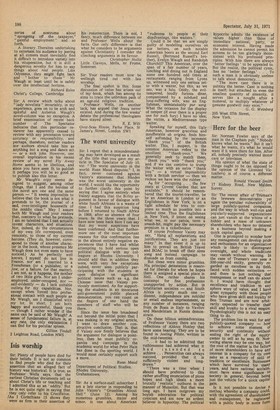The worst university
Sir: I regret that a misunderstanding may have developed as a result of the title that you gave my article in The Spectator of July 10, viz: "The worst university in the world: Ruan Maud disputes." I, in fact, never contested against Vaizey's statement that Rhodes was the worst university in the world. I would like the opportunity to further clarify this point by saying that I agree entirely when Vaizey suggests that the Birley argument in favour of dialogue with white South Africans is a waste of time. I had this suspicion long before I returned to South Africa in 1969, after an absence of four years. In the three years that I have now been back here I can say that my worst suspicions have been confirmed. And that furthermore one of the most important reasons for this confirmation lies in the almost entirely negative experiences that I have had whilst attempting to hold serious open political dialogue with my colleagues at Rhodes University. I should add that in addition they were, with very few exceptions indeed, never seen publicly participating with the students in open dialogue on significant political issues such as e.g. the Chinese issue that Vaizey previously mentioned. As for supporting the students in an innocuous anti-government public placard demonstration, you can count on the fingers of one hand the members of staff who will be there.
Since the issue has broadened out beyond the initial point that I was making in my original article, I want to draw another constructive conclusion. That is, that if Vaizey now firmly believes that the argument for dialogue is pointless, then he must publicly organize and campaign in the academic world for what Peter Hain has done in the sporting world. I would most certainly support such a move.
Ruan Maud Department of Political Studies, Rhodes University, Grahamstown, Sir: As a surface-mail subscriber I am a late starter in responding to John Vaizey's "Grumbles About Hell" (June 12). Among his numerous grumbles, major and minor, is one about American "rudeness to people at their disadvantage, like waiters."
Could it be that we are simply guilty of modelling ourselves on our betters, on such notable American boors as the second Earl Russell, (Bertrand Russell's brother), Evelyn Waugh and Randolph Churchill? This American, over the span of a fair number of years, lunching and dining out in England some one hundred odd times at restaurants ranging from Lyons up, witnessed only one serious setto with a waiter, but this, as we say, was a lulu. Oddly, the eviltempered, loudly furious diner, companioned by a subdued and long-suffering wife, was an Englishman, unmistakably pur sang. What the occasion for the display of temper (if ever there is a proper one for such fury) I have no idea; the victim, a Mediterranean type waiter.
Speaking for myself, this Ugly American, however graceless and insufferable ab origine, finds himself sof tended by the incessant "thank yous " of the British waiter. This, I suspect, is the common American reflex to the emollient " thank-yous." We generally seek to match them, "thank you" with "thank you;" and if we can contrive to trump the waiter with an extra "than you" — a virtual impossibility with a British servitor — then we reckon we have won the rubber. '
As for "occupying . . the few seats at Covent Garden that are available," it should be remembered that the tourist-traveller, be he an American in London or an Englishman in New York, is on a tight schedule: he tries to compress as much as possible into a limited time. Thus the Englishman in New York, if intent on seeing what we, in our patois, term a smash-hit, might pay the necessary premium to a ticketbroker.
Of course Professor Vaizey may say, "Hang all explanations and justifications. They are just too many." In that event it is up to him to prevail on British Travel and BOAC to break off their siren song and instead campaign to dissuade us from coming.
But these were minor grumbles. His principal detestation is reserved for liberals for whom he hopes there is assigned a special place in Hell. One rather shares his contempt for fine professions unsupported by action. But in totalitarian societies — and South Africa is pretty much one — dissent, independence are suicidal or entail endless imprisonment, as any number of instances, ranging from de Bosis in Italy to Vavilov and Mandelstam in Russia demonstrate.
On these bilious animadversions of Professor Vaizey there are two reflections of Aldous Huxley that have some bearing. They are to be found in Jesting Pilate, written in the mid-twenties.
"... it had to be admitted that ruthlessness had achieved what it had intended to achieve . .. Persecution can always succeed, provided that it is sufficiently violent and longdrawn."
"There was a time when I should have preferred to this rather snuffling enunciation of pious hopes and high ideals a more brutally ' realistic ' outburst in the manner of Mussolini. But that was long ago. I have outgrown my boyish admiration for political cynicism and am now an ardent believer in hypocrisy. The political hypocrite admits the existence of values higher than those of immediate national, party, or economic interest. Having made the admission he cannot permit his actions to be too glaringly inconsistent with his professed principles. With him there are always 'better feelings' to be appealed to. But the realist, the political cynic, has no ' better feelings.' . . . To such a man it is obviously useless to talk about democracy.... "The more cant there is in politics the better. Cant is nothing in itself; but attached to even the smallest quantity of sincerity, it serves like a nought after a numeral, to multiply whatever of genuine goodwill may exist." G. G. Weinberg 205 West 57th Street, New York.










































 Previous page
Previous page